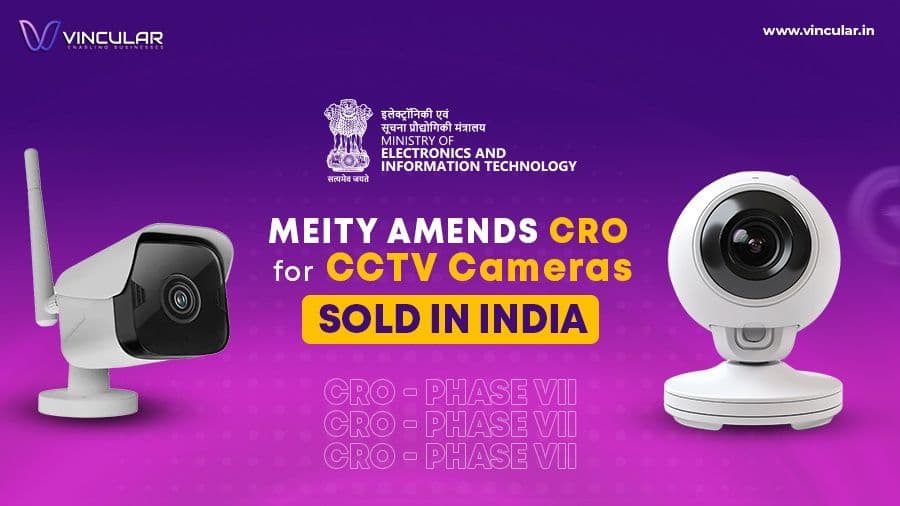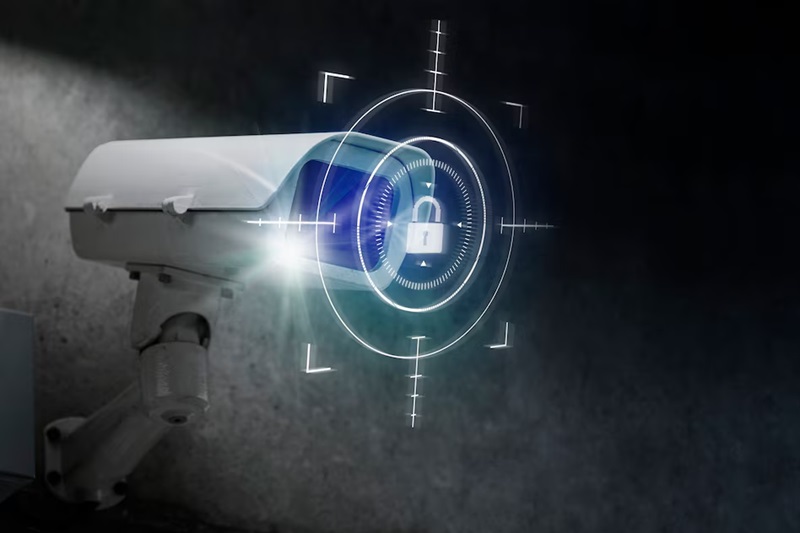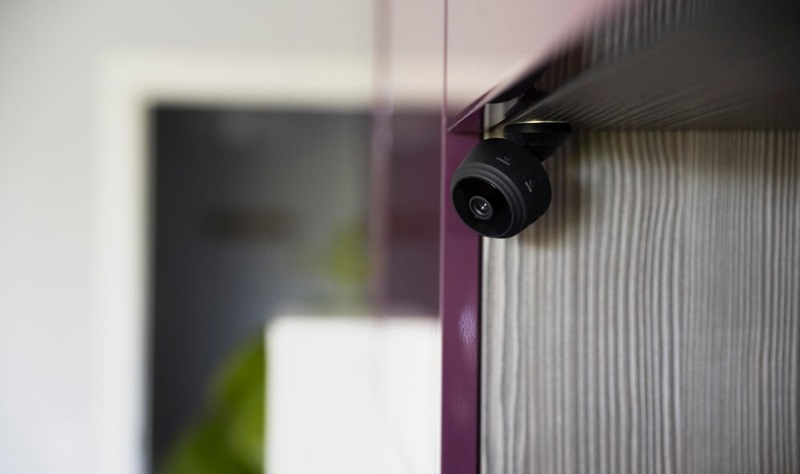
MeitY Amends CRO for CCTV Cameras sold in India
Recently, the Ministry of Electronics and Information Technology (MeitY) has announced amendments to the compulsory registration order (CRO) for closed-circuit television (CCTV) cameras manufactured, imported or sold in India. You have often seen signs saying “You are under CCTV surveillance” wherever you go. These CCTV cameras work like eyes that
Recently, the Ministry of Electronics and Information Technology (MeitY) has announced amendments to the compulsory registration order (CRO) for closed-circuit television (CCTV) cameras manufactured, imported or sold in India.
You have often seen signs saying “You are under CCTV surveillance” wherever you go. These CCTV cameras work like eyes that can see things even if you are far away. They offer remote monitoring capabilities, allowing authorities and businesses to keep a watchful eye on various locations from a distance.
For example, CCTV cameras help watch what’s happening in different places, like streets or parks. This helps keep people safe and catches anyone who might be doing something wrong.
At work, CCTV cameras make sure everyone is doing their job and not doing anything they shouldn’t. They also help stop people from stealing or breaking things. This makes the workplace safer and helps things run smoothly.
However, with the increasing reliance on CCTV cameras, they have become an integral part of our lives which raises concerns about their security and quality, and the government has taken proactive steps by mandating STQC Certification for CCTV products.
So, in this article, we are going to cover everything you need to know about the regulation, but before we start, let’s understand what standardisation testing and quality certification (STQC) certification is.
What is STQC Certification?
It is very important to ensure the safety and quality of IT goods and services in today’s fast-evolving world. This is where the testing and quality assurance services provided by the standardisation testing and quality certification (STQC) come into play.
The STQC provides a framework for ensuring the highest standards of quality and dependability in the IT and electronics sectors. It is crucial to guarantee the quality and dependability of IT goods and services in today’s fast-evolving technological world.
Notification issued by MeitY for the Public Procurement of CCTV

To ensure the safety and quality of CCTV products, the MietY made standardisation testing and quality certification (STQC) mandatory for CCTV products.
MeitY, through the said notification dated 06th March 2024, tries to clarify the mechanism for the calculation of local content of the following type of CCTV Cameras:
- Analogue-based CCTV Cameras
- IP-based CCTV Cameras
- Analogue speed dome-type CCTV Cameras
- IP speed dome-type CCTV Cameras
- DVR/NVR
The surveillance devices, i.e. CCTV Cameras only IP Speed Dome) should comply with the Essential Requirements (ERs) for security prescribed by MeitY to ensure the security of the VSS / CCTV systems.
The security testing report for CCTV/VSS is to be issued by the Standardisation Testing and Quality Certification (STQC) Laboratory. The validity of the said reports shall be 3 years.
Here are the Brief Requirements for the Security of a CCTV system:
1) Physical Security – Use tamper-resistant camera enclosures and locking mechanisms to deter physical tampering.
2) Access Control by Authentication, Role-Based Access Control (RBAC), and regularly reviewing and updating access permissions to reflect personnel changes.
3) Network security is achieved by employing encryption of data transmission.
4) Software security to be achieved through regular updates, disabling unused features, and strong password policies.
5) Penetration Testing: Employ penetration testing to assess the system’s cyberattack resistance and address vulnerabilities.
Major Categories Under which Tests have to be Conducted:
|
S.No. |
Categories |
|
1. |
Hardware Level Security Parameter (supported by software) |
|
2. |
Software/Firmware |
|
3. |
Secure Process Conformance |
|
4. |
Security Conformance at the product development stage |
Implementation of the order: The notification has been mandatory effective April 9th, 2025, from the date of releasing the gazette notification. From that date onward, no IP CCTV camera will be approved by BIS without an ER test report.
MeitY Announces Amendment to CRO and Includes ‘Essential Security Parameters’ for CCTV Cameras
On April 9, 2024, the Ministry of Electronics and Information Technology (MEITY) issued a crucial notification, enforcing Phase 7 amendments under the Comprehensive Regulatory Order (CRO) of 2021 for CCTV cameras.
The notification introduces amendments to the CRO order, requiring CCTV cameras to be tested for ‘essential security parameters’.
The major points are as below:
- As per IS 13252-1, CCTV cameras must meet the essential requirement (ER) as per Annexe A.
- This requirement will take effect six months after the publication of the gazette notification, thus on October 9, 2024.
- On October 9th, 2024, this requirement was extended for another six months, until April 9th, 2025..
- April 9, 2025, this has been mandatory and no extension has been given by Miety.
- Additionally, it will be mandatory for all the CCTV camera product categories to get test reports from a BIS-recognised lab, and it will be a pre-requisite for obtaining a license to use the Standard Mark for the product.
It guarantees that the major components of CCTV/video surveillance systems are sourced from reliable, trusted manufacturers.
Note: If you want the latest regulatory news and notifications, then follow our WhatsApp Channel or watch our Publication Space.
Significance of Mandatory STQC Certification for CCTV Cameras in India

The mandatory requirement for STQC certification for CCTV cameras was introduced in India to ensure that all security cameras sold in the country meet specified quality standards.
Here are a few reasons why this certification was made mandatory:
- This government’s decision ensures that all CCTV cameras deployed in India are free from any national security concerns.
- It guarantees that the major components of CCTV/video surveillance systems are sourced from reliable, trusted manufacturers.
- The certification ensures that CCTV cameras work well and last long. This means you can trust them to do their job properly.
- With the certification, you’re less likely to end up with low-quality or fake cameras. This keeps you safe from buying something that might not work as expected.
- In a country like India, where security is important, having good-quality cameras helps in keeping places secure and preventing crimes.
- Making STQC certification mandatory aligns with the government’s efforts to regulate the use of CCTV cameras and protect individual privacy rights.
So, by making STQC certification mandatory, the government is ensuring that the CCTV cameras you use are of good quality, trustworthy, and respectful of your privacy.
How Vincular can help you get STQC Certification?
If you’re manufacturing or selling CCTV cameras in India, Vincular can assist you step-by-step to ensure your products meet the required standards for STQC certification.
Throughout the entire process, we will provide expert advice and support to address any challenges or issues that may arise. We will ensure that your journey towards STQC certification is smooth and hassle-free.
So, by partnering with Vincular, you can streamline the certification process for your CCTV cameras, saving time, effort, and resources, while ensuring compliance with government regulations.